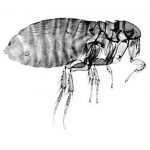
Flea control in Melbourne
Fleas are small, wingless, external parasites from the order Siphonaptera. Adult fleas range from 2 to 4 mm in length, are brown in colour and oval in shape. Fleas have small antennae and mouth parts for piercing and sucking. They feed on the blood of humans and animals. Some flea species feed from one host species only, while others can survive on a number of hosts. They have six, spiny legs, with powerful hind legs for jumping. Fleas may be a growing problem due to the increasing number of household pets.
EPC- Enviro Pest Control finds the most frequently encountered flea species found in Australian homes are:
- Cat flea
- The most common flea in Australia
- Attacks dogs, rats, humans and other mammals
- 3mm long
- Light to deep brown
- Dog flea
- Less common than the cat flea, but similar in appearance.
- Attacks a wide variety of mammals
- 1-4mm long
- Brown but can turn reddish-black after a meal
- Human flea
- Uncommon due to the increase in home hygiene standards. This flea also attacks dogs, pigs, rats and mice
Flea Disease and Contamination
Fleas have been known to:
- Infect your pets with tapeworm larvae, causing a tapeworm infestation.
- Carry a bacterium that causes ‘cat scratch fever’ in humans, which is a condition that can make humans very sick.
- Spread myxomatosis to rabbits which is fatal, but the risk can be reduced by controlling fleas
- Spread typhus disease. Typhus is caused when flea bites become infected as a result of flea-faecal contamination. However, this is uncommon
- Fleas are most notorious for transmitting bubonic plague from wild rodents to humans in some parts of the world. However, this is not known to occur in Australia
Breeding and Life Cycle of Fleas
Fleas take four forms during their life cycle: egg, larva, pupae and adult. This cycle takes 2 weeks to 8 months depending on temperature, humidity, food and the type of flea species.
- Eggs
- Adult females lay 4-8 eggs in a cluster after a blood feeding, usually on the host animal
- Fleas can lay up to 1,500 eggs in their lifetime
- Eggs are light coloured and oval shaped, and can take 2 days to 2 weeks to hatch
- Larvae
- Larvae look like translucent worms with small bristles
- Approx. 3 mm long
- Larvae may take several months to develop after hatching from eggs
- They eat digested blood from adult flea faeces, dead skin, feathers, hair and other particles of organic matter
- Once fully developed, larvae begin weaving a cocoon and become pupae
- Pupa
- Pupae grow to adult fleas inside a cocoon that sticks to pet hair, carpet fibre, dust, grass cuttings and other matter Fleas breed best during warm, moist winters and spring
- Pupae do not emerge from these cocoons until they detect a suitable host (for example, by sensing vibrations caused by humans or animals)
- Egg to pupa stages take approximately 5-14 days
- Adult
- Adult fleas may remain resting in their cocoon until they sense vibration (caused by movement), pressure, heat, noise or carbon dioxide. The ability to sense vibration explains why flea bites can occur after entering a house that has been unoccupied for some time
- When adult fleas emerge from their cocoons, they are ready for their first blood feed. Adults are quite active, crawling and jumping in hair or fur
A typical flea population consists of 50% eggs, 35% larvae, 10% pupae and 5% adults with this population developing best under warm, moist conditions. This means that any fleas you see on your pets are only the tip of the problem. Under ideal conditions, ten female fleas can multiply to over a quarter million fleas of different life stages, in just 30 days! If you have problems with fleas call EPC – Enviro Pest Control now.
Signs of Flea Infestation
A common indication of a flea infestation is if your pets are excessively scratching and grooming themselves. This is caused by the discomfort caused as the adult fleas feed on the pet’s blood. EPC – Enviro Pest Control recommends a thorough examination of the pet and its fur should be conducted by the homeowner or veterinarian. People also may experience bites which leave behind itchy marks. Check for fleas by parting the fur, particularly around the ears and rump. Look for the fleas themselves or for flea faeces. Flea faeces look like miniscule dark specks. For a positive identification, place a few of the specks on a piece of lightly moistened white tissue. Flea faeces will stain the tissue with a ring of blood.
Some people may become more sensitive to flea bites over time. Symptoms of flea bites include:
- extreme itchiness at the bite site
- a red, swollen wheal (lump) that develops within 30 minutes of being bitten
- a blister or small wound at the site of the wheal, approximately one day after being bitten
- bites concentrated on the legs and feet
- secondary infections caused by scratching the bite site
Fun Facts about Fleas
- Fleas are able to jump more than 200 times their body length
- Adult fleas can survive for many months without feeding
- Fleas reverse direction with every jump
- A flea can jump 30,000 times without stopping
Why choose EPC – Enviro Pest Control?
Flea treatment is a complex task.
If you live in Melbourne and have a flea problem of any size, you should choose EPC -Enviro Pest Control to help you solve it because:
- EPC – Enviro Pest Control technicians are Trained Specialists and are very experienced at getting rid of fleas
- We arrive on time
- EPC – Enviro Pest Control technicians are discreet, friendly and professionally presented
- Fair priced service with advice to help prevent fleas coming back
- EPC – Enviro Pest Control flea treatments provide effective flea control
If you need to speak to a professional about Flea Treatments in Melbourne, call 03 9988 5066 now.
If you have pets, at the end of your lease you are required to conduct a flea treatment on any carpeted area in your house and provide your landlord with the receipt for the service. Contact EPC – Enviro Pest Control now to arrange a treatment.

